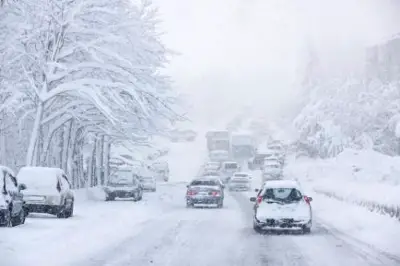Safe Driving Tips to be Thankful for this Holiday Season
 |
Advice for Winter Driving
SACRAMENTO, CA -- November 23, 2015:In anticipation of the Thanksgiving holiday and a predicted wet winter, the California Office of Traffic Safety (OTS) is sharing this important message with travelers: drive safely and be prepared for inclement weather at all times. Thanksgiving is one of the busiest travel times of the year with the likelihood of an increased number of vehicle crashes due in part to the influx of drivers on the roads. It also marks the unofficial start to the winter driving season in California. Nationally in 2013, more than 300 people were killed in vehicle collisions on Thanksgiving weekend alone. With a bit of foresight and some careful planning, you can help eliminate the stress of typical holiday travel and enjoy this time of year as planned, giving thanks alongside family and friends.
“Not only are the roads more crowded during the Thanksgiving holiday, but they can be more dangerous,” said OTS Director Rhonda Craft. “There’s no better time than now to make sure that your car is in working order and that you are prepared for any obstacles that you may face in your travels all winter.”
To help travelers stay safe, OTS recommends the following precautions:
Make sure your brakes, windshield wipers, defroster, anti-freeze, heater and lights are in top condition. Make sure your tires, including the spare, are properly inflated and the treads are in good condition.
Visit California Storms ahead of any expected heavy storm during this El Niņo season. Get the latest weather report and check quickmap.dot.ca.gov/ for current road conditions.
Buckle seat belts, everybody, every trip. Wearing a seat belt is the best defense to prevent injury and death in a crash. That includes buckling children into properly installed child safety or booster seats.
Remain alert. Constantly scan the road for brake lights in front of you.
Part of being alert is to minimize distractions, like turning off or silencing your cell phone.
If it’s raining hard, keep your vehicle in the middle lane, since water tends to pool in outside lanes.
Turn on your headlights in rainy, foggy or overcast conditions. Use low beams in fog or snow.
Do not use cruise control during wet or snowy road conditions. Cruise control can cause skidding and loss of tire traction in winter conditions.
In rain or snow, first slow down, then increase the following distance between you and the car in front. Stopping distances can double in rain, triple in snow.
Never drive through running water that could be deeper than the bottom of your vehicle.
In the event you find yourself hydroplaning or skidding, remember the following:
Do not brake or turn suddenly. Take your foot off the gas until you slow enough to feel traction on the road again
Turn your steering wheel in the direction of the skid and as you recover control, gently straighten the wheels
If you need to brake, do so with light pumping action. If your vehicle has anti-lock brakes, then brake normally, because the vehicle’s computer will mimic a pumping action
Carry an emergency kit. Build your own with tips found at Roadside Emergency Kit
Finally, don’t drive under the influence of alcohol or drugs whether they be illicit or prescription. If you are under the influence of drugs or alcohol, always designate a sober driver.


